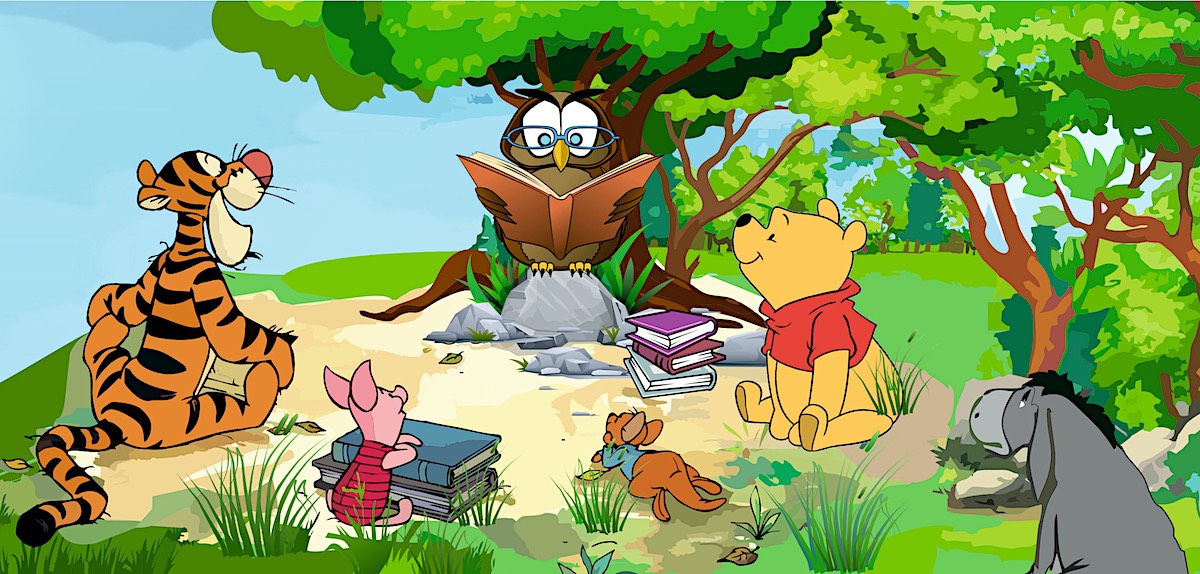How to get the best out of the Pooh’s and Piglet’s in your team
What can Winnie the Pooh, Piglet and Tigger teach us about effective leadership? And team behaviour? Well, quite a lot it seems. For starters, we know that Tigger will be the one posting inappropriate content. And Owl and Rabbit have the potential to drive everyone mad. And Pooh thinks injecting bleach sounds like a good idea. Thank goodness for Christopher Robin!
Bernadette Eichner

Since the Great Lockdown of 2020 began, we’ve been more reliant than ever on being able to motivate and inspire our teams from a distance. Gone is the equalising office environment, the group think opportunities, the ability to have a quiet spontaneous chat to someone who may be struggling, the golden moments of camaraderie around the water cooler. We’ve had to find a new way of engaging with each other.
And that means understanding the unique personalities and coping mechanisms of each one of them in ways we haven’t been forced to before.
What have Pooh and Piglet got to do with anything?
It’s not just Pooh and Piglet, but their friends Christopher Robin, Tigger, Eeyore, Owl, Kanga, Rabbit and Roo that I want to share with you. And after reading this blog, you’ll see them everywhere!
For those of you who have read A.A. Milne’s stories about Christopher Robin and his friends in the Hundred Acre Wood, I’m betting you know what I mean. Perhaps your brother is Pooh, your sister is Tigger, your workmate is Piglet…
Psychological research around the globe has long explored the link between the author’s battle with mental illness and his characters and whether they represent a range of mental disorders and/or unique personality styles. Heck, I’ve even written a personality-based team building program around them!
So, how do you tell who is who in your team and how can you best manage them, particularly in this COVID-era WFH time?
Winnie-The-Pooh – simple but loyal team member
In the COVID world, Pooh is likely to suggest injecting yourself with disinfectant as a treatment!
Pooh doesn’t think as fast as the others and is a bit impractical. Perhaps his brain growth has been stunted by being dragged down the stairs and continuously bumped on the head for all those years! The upside of this is that he is entirely open, trusting and inspires the others to look for happiness in simple things. The downside is that he sometimes gets stuck on unimportant things, suggests illogical solutions to problems and is often unaware of consequences.
The Pooh’s in your office are not natural lateral thinkers and are probably quietly criticised for lack of initiative. But they are generous and loyal team members and should be celebrated for the good cheer they bring. Your Pooh’s will respond well to:
- Lots of support from co-workers
- Clear “how to” style instructions
- Clear directions on what needs to be done and by when
- Being part of team-based activities
- Not being given too much autonomy as they find this too stressful.
Christopher Robin – your Team Leader
Christopher Robin is the calm voice in the Hundred Acre Wood and the one all the others go to in times of doubt or disagreement. He displays all the hallmarks of a good leader – intelligence, modesty, diplomacy, excellent organisational skills, an even temper, patience and compassion for the situation others find themselves in. He is dependable and reliable in times of crisis and is a consummate collaborator – he recognises he doesn’t have the answer to every problem and willingly seeks the input of others.
It’s likely your Christopher’s are already in leadership roles. But if they’re not, now might be a good time to think about putting them into one! They are generally well-liked, are successful motivators of others and will engage their teams in finding great solutions to getting things done. And they will do this without the need for constant validation. A true leader!
In our COVID world, Christopher is the one who will have everyone calm, organised and enjoying their new situation without too much lost productivity.
Piglet – smart but lacking self-confidence
In these past weeks of the Great Lockdown, your Piglets are the ones who have probably struggled a bit to adapt to the new way of working.
Piglet is an anxious little thing and while being quite smart, lacks self-confidence and as a result, suffers from considerable self-doubt. He doesn’t necessarily believe that his actions can change anything and sometimes feels quite overwhelmed by the world around him. And he tends to agree with everyone, which sometimes creates unnecessary confusion and conflict in the gang. However, with the support and encouragement of the others, he’s proven he can step up when he has to, but it often takes a lot out of him and he’s quite drained afterwards.
To get the best out of your Piglets:
- Put them into a team that has very little conflict
- Buddy them up with other more confident team members
- Give them projects that will enable them to boost their confidence
- Encourage them to have a voice at meetings, even if in a small way at first
- Praise in public and counsel in private.
Tigger – the fun and fearless workmate
Tigger is an Extrovert with a capital ‘E’ – gregarious, full of rambunctious energy, fun-loving and the person everyone loves being around. He is unrelentingly optimistic, fearless and is always on the lookout for new experiences and adventure. He’s willing to give anything a go and if it fails, has the enviable ability to just bounce back and try again. The sometimes frustrating thing about Tigger is that he doesn’t seem to have a care in the world for consequences and doesn’t seem to learn from his past mistakes. And his risk-taking behaviour can result in poor outcomes for him and any of his friends who are swept along with his idea.
Tiggers are everywhere in sales, start-ups and entrepreneurial ventures. They are great at motivating others, bring positive energy and a sense of fun to a team and they perform well under pressure.
Tiggers are incredibly self-motivated, so you don’t need to do anything much at all on that front. But to get the best out of them for your business, you may need to keep them focussed on the goal, minimise the time they spend distracting others and give them clear boundaries and frameworks within which to operate. Oh, and the COVID-19 Tiggers? They’re the ones coming up with crazy/fun/downright silly content on social media and setting their privacy to ‘Public’ when they share it!
Eeyore – the finder of problems
If there is a negative side to anything, you can be guaranteed Eeyore will find it! If we were clinically diagnosing Eeyore, you’d start with neuroticism and depression. He has low energy, is reluctant to jump in and give something a go, feels misunderstood and wonders a lot about whether others value him. He has trouble getting himself organised and finds it hard to get motivated. Frustratingly for the others at times, he doesn’t seem to think he should do anything about this.
The Eeyore’s in your workplace can be very frustrating! They can be relied upon to find all the reasons why something won’t work and not want to participate in things that might. They can be over-sensitive to what they see as criticism and tend to take a “what’s the point?” attitude to trying new things.
In your COVID-era workplace, the Eeyore’s are the ones who are probably talking the most about how hard everything is and sharing all the bad news stories. To get the best out of Eeyores:
- Acknowledge them and their contribution whenever you can - a quiet “well done” is enough
- Gently explain why you are taking the approach you are and point out the benefits of the plan
- Allow them to voice their concerns
- Keep them away from other Eeyore’s – negativity and pessimism are contagious and create an environment of self-fulfilling prophecies!
Kanga – the team nurturer
At first, the Kanga’s in your team may seem a little over-bearing and controlling. They like to keep things (and people) organised, seem to have their fingers in lots of pies and seem to get more done than anybody else. But once you get to know them, you realise they’re the ones that not only remember someone’s birthday but have organised a cake for morning tea, they’re the ones others go to for advice and they’re the ones who will often quietly help out the Piglets, Poohs and Eeyores, when everyone else is rolling their eyes in frustration.
Kanga’s are kind and nurturing and will usually always seek to diffuse conflict but often at the expense of themselves.
Kanga’s don’t need much motivating – they’re happy to turn up and do their bit and will never ask for praise or thanks. The trick with Kanga’s is to not take them for granted – they are the solid glue holding your team together and without them, things would be a lot different.
In your Covid WFH arrangements, the Kanga’s are the ones checking in on everyone else and sending encouraging messages with smiley face emojis.
Roo – the new recruit
Roo is the baby in the Hundred Acre Wood and is up for anything new – he asks lots of questions, wants to learn as much as he can from the others but sometimes misses the point because he’s young and doesn’t have a lot of life experience, therefore he often doesn’t have context. He rarely questions what he learns because he trusts the others who he sees as older and wiser. He particularly looks up to Tigger, and this isn’t always a good thing! In your team, Roo is the entry-level recruit venturing into the world of work for perhaps the very first time. He is eager to learn and make his way but needs the mentoring and patient coaching that comes with being an intern or an apprentice and needs to be guided well as his skills improve.
A solid induction program followed up with relevant, well-structured training in which he is given lots of context will ensure you get the best out of Roo! In your COVID team, Roo needs to be buddied up with someone more senior or closely monitored as he works through his tasks, so that he stays on the right track and learns to do things the way you want him to.
Rabbit – likes to get things right
On the outside, Rabbit appears friendly, reliable, dependable, and well organised. But scratch beneath the surface and there’s something a little irritating and unlikeable. The truth is, Rabbit is a bit of a know-it-all and thinks he’s smarter and better connected than anybody else. While he’s constantly looking for practical ways of improving things, which is seen as a positive thing, it’s all pretty much ‘his way or the highway’ when it comes to implementing anything. He can be bossy and can lose his temper when things aren’t done the way he wants them to be done. But deep down, he cares for his friends and just wants to be one of the gang.
Rabbits are more comfortable in positions of management rather than leadership. They are great task managers rather than inspirers and motivators. They just aren’t flexible and adaptable enough to balance all the personalities in a team. But we need them, so play to their strengths:
- Give them projects that require structure and an efficient, pragmatic approach
- Enable them to be able to have the final check to know something has been done correctly
- Include them on tasks where detail and accuracy is paramount
- But be sure to help them develop their leadership skills so as not to alienate team members.
In your COVID team, the Rabbits are the ones who are probably complaining about the lack of clear structure and suggesting you let them take control of things – after all, if they were in charge things would be done properly!
Owl – the keeper of knowledge
Owl is the oldest member of the group and most of his friends believe that he is the most intelligent of them all. And Owl agrees wholeheartedly and takes his role of Mentor and Font of Knowledge very seriously! However, throwing around unverified facts and figures, making long-winded, puffed-up speeches about this or that, and using jargon to confuse people only makes you appear intelligent. For a little while. The truth is that Owl is of average intelligence and works mainly from personal opinion rather than evidence-based thinking. He can get cross and easily annoyed, especially when he’s interrupted - he doesn’t enjoy being asked to clarify or verify too much.
At work, because they are the ultimate self-promoters, Owls are often found in positions that are beyond their capabilities. This can be frustrating for those on the ladder below who are smarter, particularly when the Owls feel the need to advise everyone all the time. But they are rarely moved on by management - even though they can be irritating, their need to be across everything that’s happening means they have a heap of corporate knowledge and intellectual capital under their belt.
Owls need very little motivating. Partly because they believe the place would fall down without them, and partly because they feel it is their duty to make sure everyone knows what they should be doing and how they should be doing it.
Owls would have had a lot to say in your team’s deliberations about how to navigate the transition to WFH - after all, they are the expert on everything!
Leading your Hundred Acre Wood team to success
So, now you know who’s who in your Hundred Acre Wood, you can tailor your leadership style to get the best out of each one of them, even when you can’t be there.
Christopher is the calm and reliable leader, Tigger will bring enormous fun but needs to be kept focussed, Kanga will ensure that everyone is travelling well emotionally, Rabbit can be depended on to provide structure and good governance, Pooh will just turn up and cheerfully do what he’s clearly asked to do, Roo enthusiastically wants to learn as much as possible, Eeyore will identify any problems you may need to know about, Piglet is loyal and hard-working, and Owl brings the voice of experience.
The most successful team will have a bit of everyone in it.
Professional recruitment and fair pricing? Yes, it‘s possible!
At Just Right People Recruitment we‘ll give you the flexibility to choose between three different pricing models. And we guarantee each one will deliver a high-quality recruitment outcome tailored to your job, your budget and your specific needs. Now, that’s fair!
Learn more…Bernadette Eichner
Bernadette Eichner, Cofounder and CEO of Just Right People, is a recruitment industry entrepreneur and thought leader in Australia, totally committed to improving the recruiter experience for clients and candidates alike. Her secret to life is to “just do the next thing that needs to be done”.
Follow Bernadette

